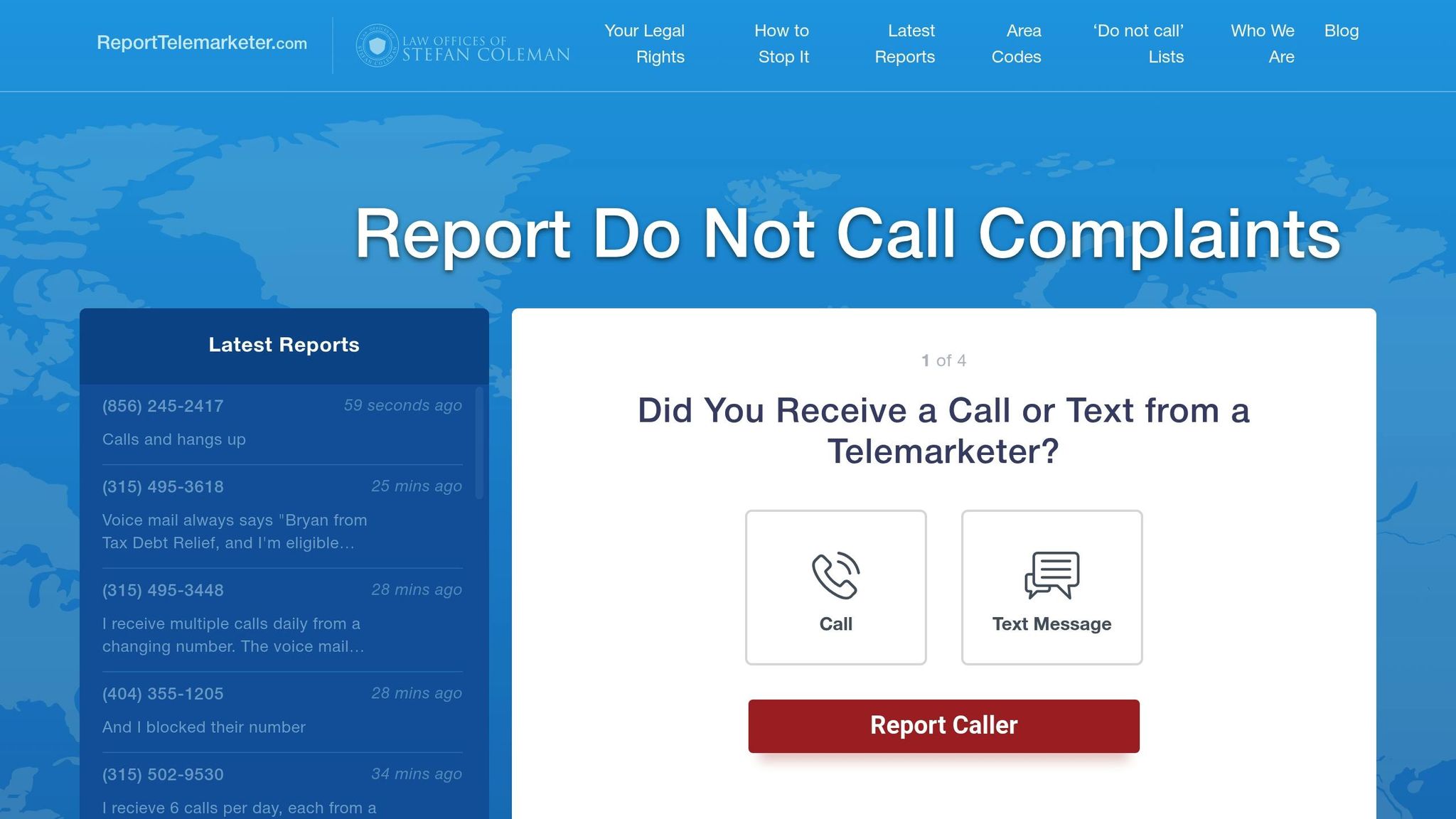
Telemarketing scams are designed to steal your money or personal information through misleading phone calls or texts. Protecting your family starts with knowing what to look for.
Here’s how scammers operate and how you can stay safe:
- Common Scams: Fake prize notifications, urgent payment demands, tech support scams, and phony charity appeals.
- Warning Signs: Pressure to act quickly, requests for sensitive info, or payment via gift cards, wire transfers, or cryptocurrency.
- Caller ID Tricks: Scammers spoof numbers to appear local or from trusted organizations like the IRS.
- Too-Good-to-Be-True Offers: Claims of winning contests you didn’t enter or promises of instant debt relief.
Steps to Protect Your Family:
- Create a Family Safety Plan: Assign a contact person to handle scam-related issues, block unwanted calls, and set phone safety rules.
- Report Suspicious Calls: Use tools like ReportTelemarketer.com and report to the FTC or your phone carrier.
- Secure Personal Information: Monitor accounts for unusual activity and update passwords.
SCAM STOPPER: Telemarketing Scams
Warning Signs for Phone Scams
Spotting telemarketing scams takes awareness and knowing what to look for. By recognizing certain red flags, families can better guard themselves against fraudulent calls.
Tricks Scammers Use
Scammers often use pressure tactics to push you into quick decisions. They might say things like "act now" or "limited time offer." Be cautious of callers who:
- Demand immediate payment through gift cards, wire transfers, or cryptocurrency
- Ask for sensitive details like Social Security numbers or bank account information
- Urge you to act quickly without consulting anyone else
- Call at odd hours, such as before 8 AM or after 9 PM
Caller ID Spoofing
Scammers can manipulate caller ID to make their numbers look legitimate. Pay attention to these signs:
- Numbers that match your area code and first three digits (a trick called "neighbor spoofing")
- Numbers pretending to be from government agencies like the IRS or Social Security Administration
- Numbers that seem to belong to well-known companies
- International numbers with strange or unexpected formats
Legitimate businesses usually stick to consistent phone numbers, which you can verify through their official websites or customer support.
Too-Good-to-Be-True Promises
Be wary of offers that seem unrealistically generous. Watch out for callers who:
- Say you’ve won a contest you never entered
- Guarantee high investment returns or risk-free opportunities
- Promise to erase debt instantly
- Claim you qualify for government grants or unclaimed funds
- Offer medical equipment or services without proper paperwork
The best way to protect your family is by keeping communication open. If anyone gets a suspicious call, they should talk it over with others before making any decisions. A team approach can prevent rushed choices that might lead to financial loss.
Use these warning signs to create a plan that keeps your family safe from scams.
Family Safety Plan
Creating a clear plan can help reduce the risk of scams. By setting up simple protocols, you can better protect everyone in your household. This plan works alongside earlier warnings to build a solid defense.
Choose a Family Contact Person
Pick a dependable, tech-savvy family member to handle scam-related tasks. This person should screen calls, log suspicious activity, and coordinate responses. They should also be comfortable reporting scams and keeping records.
Block Unwanted Calls
Use available tools to block unwanted calls. While scammers often switch numbers, blocking remains a key step in staying safe.
- Enable built-in call-blocking features on your phone.
- Register your number with the National Do Not Call Registry.
- Turn on spam filters offered by your phone carrier.
- Keep a record of blocked numbers for reference.
For additional help, websites like ReportTelemarketer.com can investigate unwanted calls for free. They may even send cease and desist letters or file formal complaints to stop persistent calls.
Phone Safety Rules
Set clear rules for handling phone calls to protect your family:
- Let calls from unknown numbers go to voicemail, especially at odd hours.
- Never share personal or financial information over the phone.
- Check with the family contact person before responding to unexpected offers.
- Keep a list of verified business numbers handy for quick reference.
Scammers often target multiple family members, so staying open about suspicious calls is crucial. By following these steps and working together, your family can build a strong shield against telemarketing scams.
sbb-itb-a8d93e1
Steps to Take After a Scam Call
Taking quick action after a suspicious call can help safeguard your information and prevent future scams. Here’s what you should do immediately.
After following your Family Safety Plan, take these steps to document the incident and secure your personal data.
Record Call Details
Write down all the details of the call while they’re still fresh in your mind:
- Date, time, and the number that appeared on your phone
- Name of the company or organization the caller claimed to represent
- What the caller said or promised
- Any pressure tactics or threats used
- Names or employee IDs the caller provided
- Buttons you pressed or information you shared
Store this information in a notebook or digital file that’s easy for your family to access. These notes can be essential when reporting the scam or spotting patterns in future attempts.
File Official Reports
Reporting the scam can help protect not just your family, but others as well. Start by using ReportTelemarketer.com to file a dispute and initiate action. You may also want to report the incident to:
- The Federal Trade Commission (FTC)
- Your state’s consumer protection office
- Your phone carrier’s fraud department
Protect Shared Information
If you shared personal information during the call, take immediate steps to secure your accounts. Contact your bank or financial institutions to alert them, keep an eye on your accounts for unusual activity, and update passwords. Adding two-factor authentication can provide an extra layer of security for all family accounts.
Keep Your Family Protected
Staying alert and working together as a family can help protect against telemarketing scams.
Check Safety Updates
Make it a habit to check official scam alert sources. The Federal Trade Commission’s scam alert database and local news are great places to start. Share any new scam patterns with your family, especially with older relatives who may be more vulnerable. Regularly update your caller ID blocking list and explore the latest security features offered by your phone carrier. These small steps can make a big difference in how your family handles unwanted calls.
Practice Safe Call Responses
Use your updated knowledge to establish clear responses for suspicious calls. Here are some examples:
- "I need to check with our family contact person first."
- "Please send any requests in writing to our mailing address."
- "I don’t handle financial matters over the phone."
Schedule a monthly family meeting to review experiences and refresh everyone’s awareness of common scam warning signs.
Use ReportTelemarketer.com

If you encounter a suspicious call, ReportTelemarketer.com is a helpful tool for follow-up. This free service simplifies reporting and assists with consumer protection efforts.
Here’s how to use it:
- Record the details of the suspicious call and submit them to ReportTelemarketer.com.
- The service investigates potential violations of consumer protection laws.
- When necessary, they issue cease-and-desist letters or take formal legal action.
This process helps ensure telemarketers are held accountable – all without any cost to you.
Conclusion: Family Team Approach
Keeping your family safe from telemarketing scams takes teamwork and open communication. By joining forces, families can build a strong line of defense against deceptive callers and safeguard everyone in the household.
Set clear guidelines and share responsibilities when it comes to scam prevention. For example, one family member might handle screening suspicious calls, while others help older relatives with phone security features. When everyone knows their role, the household becomes better equipped to handle fraud attempts. Stay informed and adjust your approach as scammers come up with new tricks.
This is an ongoing effort. Regular check-ins, updating safety practices, and tools like ReportTelemarketer.com can strengthen your defense. Clear communication and defined roles make it tougher for scammers to find weak spots. With the right strategy and tools, your family can stay one step ahead of telemarketing scams.